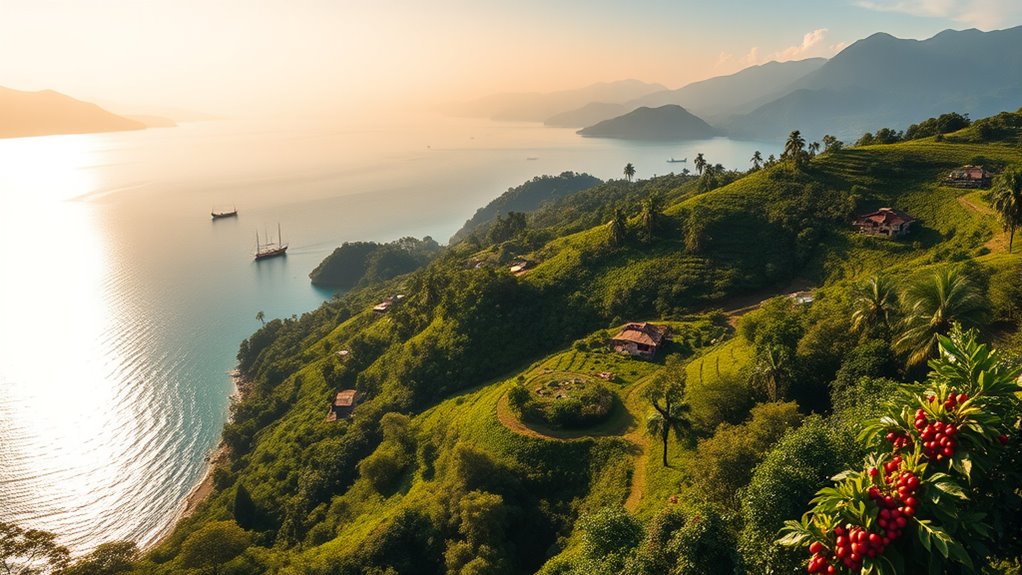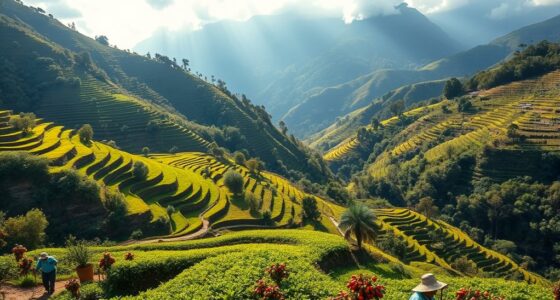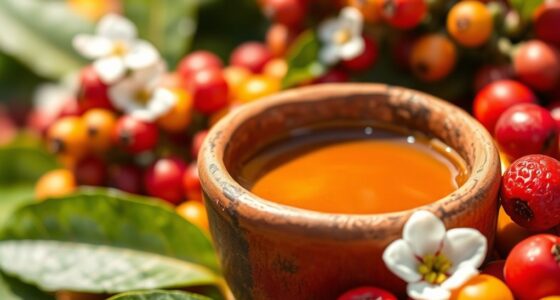Kivu Lake coffees from the Democratic Republic of Congo offer a rich, complex flavor profile thanks to the region’s unique climate, altitude, and sustainable farming methods. Farmers prioritize shade-grown and organic practices, which support ecological balance and produce high-quality beans. Their dedication to fair trade and innovative export strategies helps uplift local communities while boosting global reputation. If you want to discover how these coffees blend tradition, sustainability, and flavor, there’s more to uncover below.
Key Takeaways
- Kivu Lake region in DRC offers unique coffee varieties influenced by its high-altitude, climate, and natural landscape.
- Local farmers adopt sustainable and shade-grown practices to preserve land and biodiversity.
- Coffee from Kivu Lake benefits from fair trade and community-focused export strategies, supporting local development.
- The region’s coffees are known for rich, complex flavors resulting from its environmental conditions and sustainable farming.
- Ethical production and quality control enhance Kivu Lake coffees’ reputation in international markets.

Nestled around the stunning shores of Lake Kivu, Kivu Lake Coffees offers some of the most unique and flavorful beans you’ll find anywhere. As you explore these coffees, you’ll quickly notice that their exceptional taste results from a careful combination of climate, altitude, and dedicated farming practices. The farmers here prioritize sustainable farming methods, ensuring that their land remains fertile and productive for generations to come. This approach not only benefits the environment but also enhances the quality of the beans, giving you a richer, more vibrant cup. Sustainable farming in this region involves organic fertilization, minimal use of chemicals, and crop diversification, which helps prevent soil degradation and preserves biodiversity. Additionally, the region’s shade-grown techniques support ecological balance and promote biodiversity, further enhancing the coffee’s unique profile. Understanding the importance of maintaining high standards, local farmers and cooperatives have adopted innovative coffee export strategies to reach international markets effectively. These strategies focus on quality control, fair trade practices, and building long-term relationships with buyers worldwide. By emphasizing quality at every stage—from cherry picking to processing—they ensure that only the best beans leave the region, commanding premium prices and supporting local communities. These export strategies also emphasize transparency and traceability, giving consumers confidence in the origins of their coffee. As a result, Kivu Lake Coffees has gained recognition for its consistent quality and ethical production. You’ll also notice that the region’s coffee is often shade-grown, which protects the environment and promotes biodiversity. This method reduces the need for chemical inputs and helps maintain natural habitats for birds and other wildlife, aligning with sustainable farming principles. The combination of shade-grown practices and organic methods results in beans that are not only environmentally friendly but also rich in complex flavors. When you brew a cup of Kivu Lake Coffee, you’re tasting the result of a harmonious relationship between nature and diligent farmers committed to sustainable practices. Furthermore, the local coffee industry actively participates in fair trade initiatives, ensuring farmers receive fair compensation for their hard work. This fair trade focus encourages continued investment in sustainable farming techniques and community development projects. These efforts help lift local farmers out of poverty and promote economic stability in the region. In essence, Kivu Lake Coffees embodies a perfect blend of tradition, sustainability, and strategic export efforts. By supporting these coffees, you’re not just enjoying a remarkable beverage—you’re contributing to a sustainable future for the farmers and the environment of the Democratic Republic of Congo. This region’s dedication to quality and ethical practices makes each cup a celebration of resilience, community, and the vibrant flavors that only Kivu’s unique terroir can produce.
Frequently Asked Questions
What Are the Specific Health Benefits of Kivu Lake Coffees?
Kivu Lake coffees offer notable health benefits, thanks to their rich antioxidant properties. When you enjoy these coffees, you’re helping your body combat free radicals, which can cause cell damage. The antioxidants may support your immune system, improve mental alertness, and reduce inflammation. Drinking Kivu Lake coffee regularly can contribute to better overall health, making it a delicious way to boost your well-being while savoring a unique, locally sourced brew.
How Do Local Farmers Harvest and Process These Coffees?
You’d think harvesting and processing are as simple as picking and washing, but locals use meticulous harvesting techniques, selectively hand-picking ripe cherries. They then process the coffee through traditional methods like wet and dry processing, carefully fermenting and drying the beans under the sun. This labor-intensive approach preserves the unique flavors of Kivu Lake coffees, showing that even in remote areas, craftsmanship and tradition turn simple tasks into an art form.
Are Kivu Lake Coffees Available Internationally or Only Locally?
You can find Kivu Lake coffees internationally, but export challenges sometimes limit their availability. International demand for these unique coffees grows, yet logistical issues, political instability, and infrastructure problems make it harder to get them worldwide. If you’re enthusiastic to try Kivu Lake coffees, look for specialty coffee shops or importers that focus on ethically sourced, unique beans, but be prepared for occasional shortages due to these export hurdles.
What Environmentally Sustainable Practices Are Used in Coffee Cultivation?
You’ll find that environmentally sustainable coffee cultivation often involves shade-grown methods, which protect biodiversity and reduce the need for chemical inputs. Farmers also use organic fertilizers to enrich the soil naturally, minimizing environmental impact. These practices help preserve ecosystems, improve coffee quality, and promote long-term sustainability. By supporting shade-grown and organically fertilized coffee, you contribute to eco-friendly farming that benefits both farmers and the planet.
How Does the Local Culture Influence Coffee Production Methods?
Imagine a time traveler witnessing local farmers practicing traditional rituals that influence coffee production. You notice they rely on indigenous techniques passed down through generations, shaping their methods. The community’s values and customs deeply influence how they cultivate and harvest coffee, blending cultural identity with farming practices. This connection to tradition guarantees that their methods respect local heritage, creating a unique coffee that embodies the spirit of their culture.
Conclusion
As you explore Kivu Lake coffees, you realize there’s more beneath each sip than just rich flavor. The secrets of this unique region hint at stories waiting to be uncovered—stories that could change how you see coffee forever. Will you take the plunge and discover what truly makes these beans so special? The answer lies just beyond the next cup, beckoning you to explore deeper. Are you ready to uncover Kivu Lake’s hidden coffee treasures?









